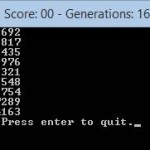Anders Hesselbom
Programmerare, skeptiker, sekulärhumanist, antirasist.
Författare till bok om C64 och senbliven lantis.
Röstar pirat.
Evolutionary sudoku
2013-11-07
This is a successful attempt to use an evolutionary algorithm to generate a sudoku board. A complete board is created after usually less than a million iterations, sometimes after a couple of hundred generations.
using System; using System.Collections.Generic; using System.Linq; using System.Text; using System.Threading.Tasks; namespace ConsoleApplication1 { class Program { static void Main(string[] args) { var s = new Sudoku(); s.Display(); Console.Write("Done. Press enter to quit."); Console.ReadLine(); } } class Sudoku { int[,] field = new int[9,9]; const int mutation_speed = 3; const int dead_end_limit = 60000; public Sudoku() { var r = new Random(); //Create a list of possible characters on the game field. var l = new List<int>(); for (var i = 1; i < 10; i++) for (var j = 1; j < 10; j++) l.Add(i); //Place them on the field randomly. for (var i = 0; i < 9; i++) for (var j = 0; j < 9; j++) { var index = r.Next(0, l.Count); var value = l[index]; l.RemoveAt(index); this.field[j, i] = value; } //Prepare for score counting. Low is better. int score = int.MaxValue, iterations = 0, generations = 0, iterations_since_last_climb = 0; //Define how a mutation works - a random element swap. Action<int[,]> mutate = a => { var speed = (score > 2 ? mutation_speed : 1); for (var i = 0; i < speed; i++) { int x1 = r.Next(0, 9), y1 = r.Next(0, 9), x2 = r.Next(0, 9), y2 = r.Next(0, 9); var v = a[x1, y1]; a[x1, y1] = a[x2, y2]; a[x2, y2] = v; } }; //Show progress. Action status = () => { Console.Title = string .Format("Score: {0:00} - Generations: {1:000} - " + "Iterations: {2:000000}" + " - Since last climb: {3:00000}", score, generations, iterations, iterations_since_last_climb); }; //Let evolution work. do { iterations++; //If adaptation has stopped, the parent must mutate. if (iterations_since_last_climb >= dead_end_limit) { mutate(this.field); score = this.GetScore(this.field); } //Breed two new sudokos and modify them slightly. int[,] child1 = (int[,])this.field.Clone(); int[,] child2 = (int[,])this.field.Clone(); mutate(child1); mutate(child2); //Check new scores. var child1score = this.GetScore(child1); var child2score = this.GetScore(child2); //Keep the best one, if any. Action<int[,], int> keep = (a, s) => { this.field = (int[,])a.Clone(); score = s; generations++; iterations_since_last_climb = 0; }; if (child1score < score) keep(child1, child1score); else if (child2score < score) keep(child2, child2score); else iterations_since_last_climb++; System.Threading.Thread.Yield(); if ((iterations % 1000) == 0) status(); #if DEBUG this.Display(); Console.CursorTop = 0; #endif } while (score > 0); status(); } private int GetScore(int[,] p) { //Define how fitness is determined. A better solution is wanted. Func<int[,], int, int, bool> checkrow = (arr, x, y) => { var val = arr[x, y]; var count = 0; for (var i = 0; i < 9; i++) if (arr[i, y] == val) count++; return (count == 1); }; Func<int[,], int, int, bool> checkcol = (arr, x, y) => { var val = arr[x, y]; var count = 0; for (var i = 0; i < 9; i++) if (arr[x, i] == val) count++; return (count == 1); }; Func<int[,], int, int, bool> checksection = (arr, x, y) => { var section_x = x; while (!((section_x % 3) == 0)) section_x--; var section_y = y; while (!((section_y % 3) == 0)) section_y--; var val = arr[x, y]; var count = 0; for (var row = section_x; row < section_x + 3; row++) for (var col = section_y; col < section_y + 3; col++) if (arr[col, row] == val) count++; return (count == 1); }; var score = 0; for (var i = 0; i < 9; i++) for (var j = 0; j < 9; j++) { if (!(checkrow(p, j, i))) score++; if (!(checkcol(p, j, i))) score++; if (!(checksection(p, j, i))) score++; } return score; } public void Display() { for (var y = 0; y < 9; y++) { for (var x = 0; x < 9; x++) Console.Write(field[x, y]); Console.WriteLine(); } } } }
Update 2023-02-09: .NET 7.0 source code
Categories: C#, Geeky, Microsoft .NET
One response to “Evolutionary sudoku”
Leave a Reply
En kopp kaffe!
Bjud mig på en kopp kaffe (20:-) som tack för bra innehåll!








Evolutionary sudoku: http://t.co/tUxZUkdJ6Q #sweskep